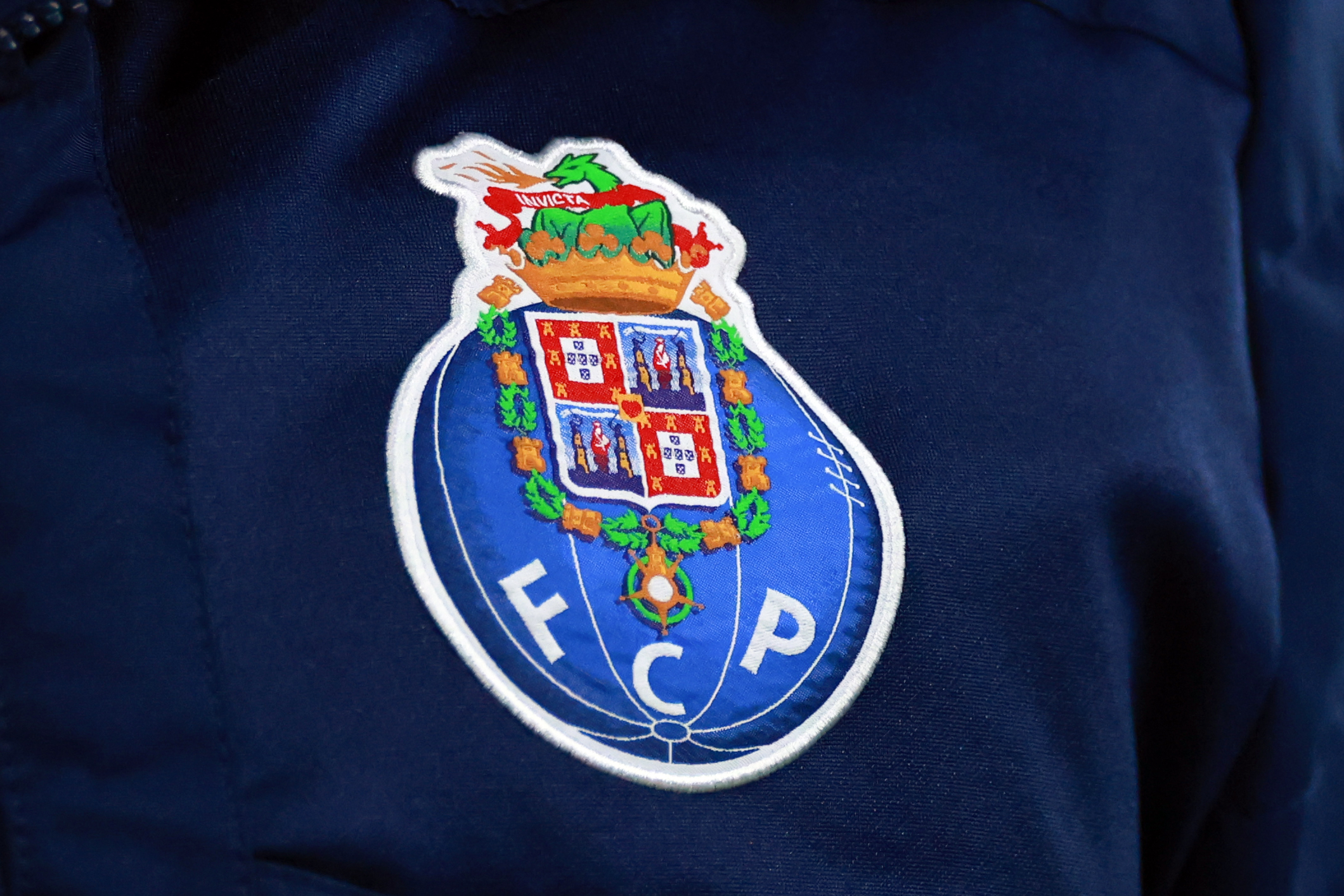Eric Abidal: Guardiola worked hard, but he was a bit lucky to win everything in his first season
The former Barcelona, Lyon and France full-back answers your questions on Pep's Barcelona, his France career and battle with liver disease...
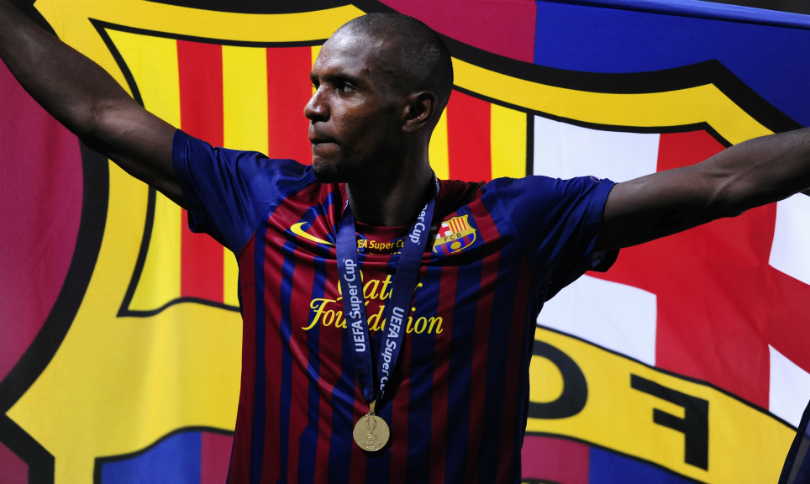
Date of birth: 11/09/1979
Place of birth: Lyon, France
Height: 6ft 1in
Position: Defender
Clubs: 2000-02 Monaco 26 games (0 goals); 2002-04 Lille 68 (1); 2004-07 Lyon 107 (2); 2007-13 Barcelona 193 (2); 2013-14 Monaco 29 (0); 2014 Olympiacos 15 (0)
International: 2004-13 France 67 (0)
Honours:Ligue 1 2004-05, 2005-06, 2006-07; La Liga 2008-09, 2009-10, 2010-11, 2012-13; Copa del Rey 2008-09, 2011-12; Supercopa de Espana 2009, 2010, 2011; UEFA Champions League 2008-09, 2010-11; UEFA Super Cup 2009, 2011; FIFA Club World Cup 2009, 2011; Superleague Greece 2015; Greek Cup 2015
Barcelona has figured prominently in the life of Eric Abidal. It is the city that the former Monaco, Lille, Lyon, Barça and Olympiacos defender has called home for most of the past decade.
It’s where his three daughters go to school, and where, over two years, he received treatment for liver cancer, during which support flooded in from all around the football world. The Catalan city, not coincidentally, is also where the 67-cap France international enjoyed the greatest moments of his career.
“Just for you,” Abidal says, in English, as he puts the 2011 Champions League Final on the screen in his office at the Eric Abidal Foundation. It was a match in which he played the full 90 minutes just 71 days after his first operation on his liver. At the end, his Barcelona side having won 3-1, Carles Puyol handed the Frenchman the captain’s armband and told him to go and lift the trophy. It was the high point of a fine career, and a match in which the fast, strong and technically sound defender excelled.
The best features, fun and footballing quizzes, straight to your inbox every week.
If you hadn’t become a footballer, what do you think you would have done as a career?
Gale Williams, Facebook
It was my dream to be a footballer, but I broke both my legs when I was 17 and my dream became very difficult. I was studying to be a painter and decorator in Lyon. I wasn’t bad, but not the best in the class. At 18, I played a cup game with AS Lyon Duchere – an amateur team – against Nice, who were in the second division.
Some guys from Monaco came to the stadium to watch a Nice player. My team played really well and we won 4-0. The Monaco guys rang our club president and asked to take me on trial for one week. I did that week in February. They told me to return in June, when I signed a five-year contract. My dream was complete.
You played for Lille and Monaco before moving ‘home’ to Lyon at the age of 24. Were they your boyhood club?
Mike Keller, Facebook
I grew up in the city so I was a Lyon supporter as a kid, and sometimes I went to the stadium. It was difficult: the tickets were not cheap and in my neighbourhood the families didn’t have too much money. But we were sometimes given tickets by an association in Lyon.
Ludovic Giuly, who later went to Barcelona, was the best player. I wanted to go on trial at Lyon when I was a child, but each time I got another letter saying it was not possible because I was too skinny. They said that every year, four or five times. So in the end I had to go elsewhere.
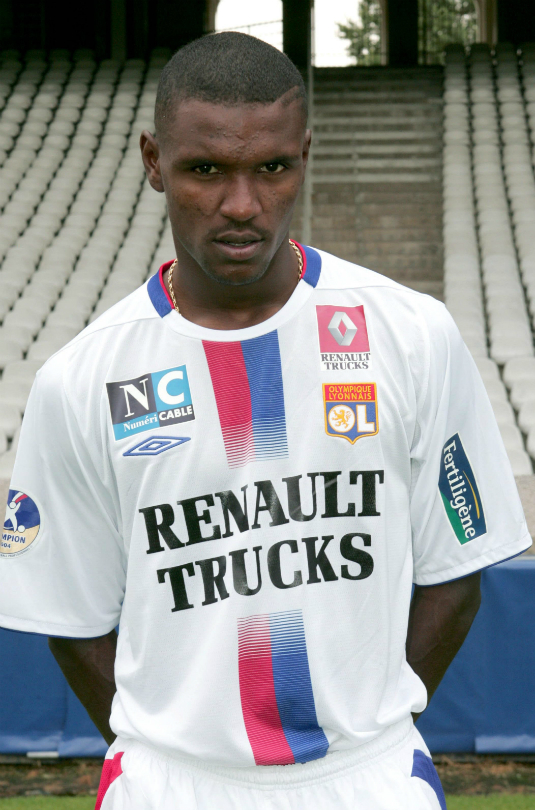
Is it true that your first goal as a professional – for Lyon against your previous club, Lille – led to your parents getting married, after an agreement was made between the three of you? Didn’t that add quite a lot more pressure?
Taimour, Hull
Yes, it did! I told them that they had to marry when I scored a goal. I was saying this for years, but they waited a long time because I wasn’t scoring. I had been a footballer for four or five years when it finally happened. They were happy to finally marry – I think!
We had [Karim] Benzema come through at the end and he was there when Lyon won their last title in 2008, but if you want to beat the best then you need the best players.
Seeing as Lyon won the league in each of your three seasons there, during a run of seven straight titles, should that team have done better in the Champions League?
Karel Beaudry, Lyon
It’s all about the small details. Lyon were one of the best teams in Europe and tried to improve each year, but we’d always come up against bigger, richer teams with more experience than us.
If we’d had a very, very good striker then maybe the situation would have been different. We had [Karim] Benzema come through at the end and he was there when Lyon won their last title in 2008, but if you want to beat the best then you need the best players.
Lyon have not won the title since, but now they use younger players and, in the future, with a bigger new stadium which will be ready for Euro 2016, they can be a big team again.
I read that your move to Barcelona came after you told Lyon you wouldn’t train until the transfer was completed. Do you look back on that episode with regret? Is there anything you would have done differently?
James Burgess, Birmingham
That’s not true. I called the president and vice-president and told them that I wanted to go to Barcelona.
I said: ‘Barcelona want me and you have to find a solution’. I was actually on holiday in Barcelona with my wife and on the way home when I received a call saying that I had to stay in Barcelona to sign my contract as the clubs had agreed a deal.
We’d checked the luggage onto the plane, so I called the airport and asked for my luggage back because I had no clothes! They weren’t used to such a request, but in Barcelona the people are usually happy to help Barça. We checked back into a hotel and I signed for Barça the next day.
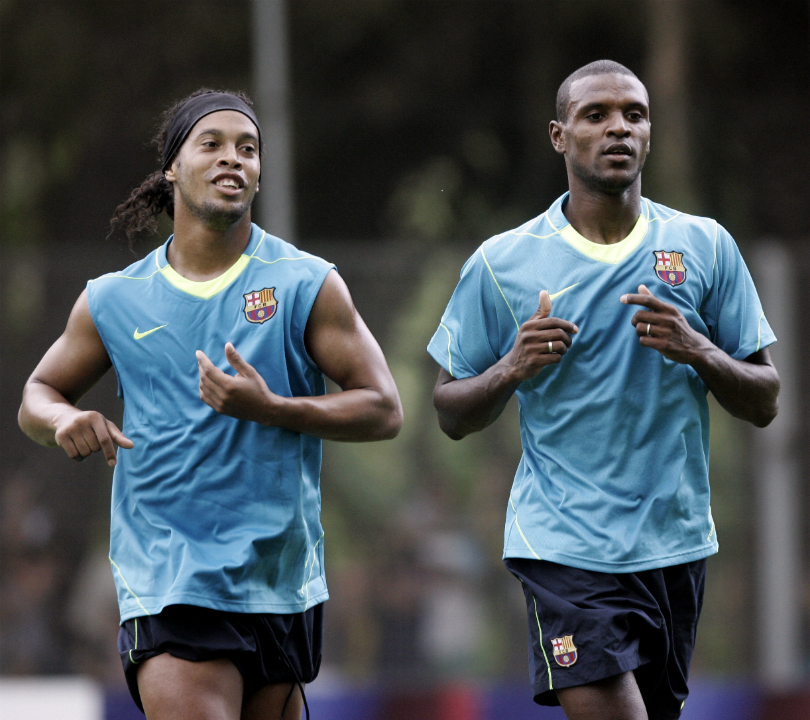
Having played under both at Barcelona, what would you say were the differences between Frank Rijkaard’s style and Pep Guardiola’s?
Andre, via Twitter
Every coach has their plan and their tactical solutions. Rijkaard did very well at Barça – he won the Champions League and La Liga. People shouldn’t forget that just because two teams have won the Treble since then.
Guardiola was different, of course. He was younger and had just finished playing. He gave Barça a different idea of football. He said, ‘play the ball, pass, pass, pass, touch, touch, touch, then in the last 30 yards, make a difference’.
Guardiola worked hard, but he was a little bit lucky to win all the trophies in his first season. Sometimes you need a little bit of luck.
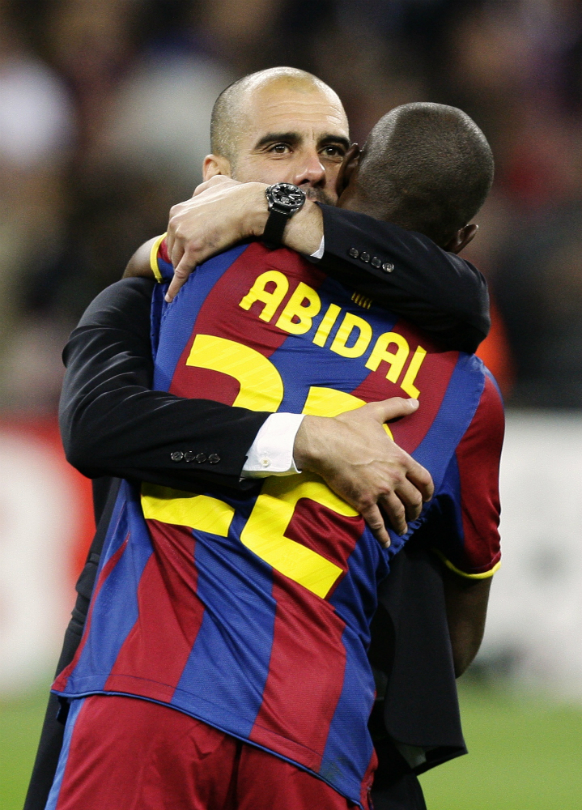
What made Pep’s Barcelona so successful? Did he instil a lot of confidence in the players, or was it his tactics and style that made the difference? Did you ever see him lose his cool?
Aaron Fry, via Twitter
Of course I saw him get angry. It’s the same with every coach.
After his very first home game, against Racing Santander, he called a meeting in the dressing room. We’d already lost the first away game, at Numancia, and now we had drawn at Camp Nou.
Guardiola said: ‘Look, guys, we worked hard in pre-season, but you have to believe in my plan if you want to win La Liga and the Champions League’. After that, the team played like Guardiola wanted. At first, he’d faced egos and resistance to change. Players wanted to play how they wanted, but after that meeting everything changed.
We won our next league game 6-1 away at Sporting Gijon. Guardiola worked so hard. Every day, from eight in the morning until eight at night, he was in the training centre watching young teams. He was coming up with new tactics, always planning the little details. This was a big reason he was so successful.
Was it boring, being a defender in a team that had so much possession? Did it make it difficult to concentrate?
Hassan, via Twitter
Never. The defender has to be focused at Barça, not just with the opposition strikers, but when our strikers lost the ball. That happened all the time. You can’t fall asleep when you play as a defender at Barça; you are part of the attack and have to press all the time.
After the game, he said: ‘This is my mistake. I wanted to change the tactics. I was wrong. Ignore what just happened
Which was the best performance by that great Barcelona team? The 5-0 win against Real Madrid in the Clasico in 2010?
Rogerio, via Twitter
[Without hesitation] The 5-0 and the 6-2 in 2009 against Real Madrid. It’s difficult to score against Madrid, but to win 5-0 and 6-2 was incredible. Can you imagine it, to score six times in the Bernabeu?
Guardiola was always really important in the matches against Madrid. We played them in the Copa del Rey final [in 2011] in Valencia and lost to a goal from Cristiano Ronaldo in extra time.
After the game, he said: ‘This is my mistake. I wanted to change the tactics. I was wrong. Ignore what just happened – we have to play Madrid twice in the Champions League semi-finals now. We will change the tactics for these two games and we will see what happens.’ He did change the tactics significantly.
He told the defenders not to cross the halfway line because Madrid played counter-attack. Even Dani Alves didn’t look like a winger. We stayed deep; we held back with [Sergio] Busquets in front of us. And what happened? Bye bye Madrid! [Barcelona won 3-1 on aggregate] Guardiola thought differently.
People say Barcelona always played the same, but he’d change little tactical things. Once, he said to me and Victor Valdes before a Clasico: ‘Valdes, give the ball to Abidal and we’ll attack on that side, because Ronaldo does not defend’. We did and it worked – we got behind them straight from the goalkeeper.
You and Dani Alves were very close at Barcelona. Do you still see each other? Who are your other friends in football?
Luis, via Twitter
I have many friends in football. My daughters go to the same school as Dani’s children and I see him quite often. This is a man who offered me his liver when I was ill. It was an unbelievable gesture, and he was serious about it, but I could never have accepted it.
As for the current players, I try not to disturb them as they don’t have so much time, but I’m good friends with [Carles] Puyol, Seydou Keita, Benzema, [Franck] Ribery and others. In terms of friendships, football’s been good to me.
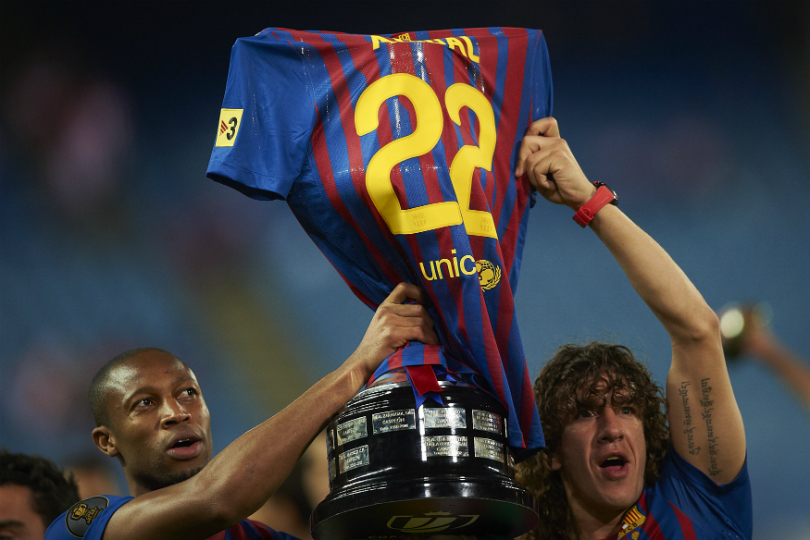
What’s the funniest thing you have ever seen Lionel Messi do?
Freesia, via Twitter
After one training session, we all practised free-kicks with Jose Manuel Pinto in goal. Each time Messi took the free-kick, he told Pinto exactly where he was going to put it and to stand there so he could save it.
Pinto ignored him and every time Messi put the ball in the exact spot he had mentioned. Messi said: ‘I told you where I was going to put the ball – why didn’t you just wait there?’ He did the same thing 10 times and scored 10 times. Everybody was laughing like crazy.
Messi said: ‘I told you where I was going to put the ball – why didn’t you just wait there?’ He did the same thing 10 times and scored 10 times.
Did missing the 2009 Copa del Rey and Champions League finals through suspension ruin the Treble for you? What was it like to sit watching from the stands in Rome as Barça beat Manchester United?
Laura Matthews, via Twitter
It was a difficult moment because when you arrive at the stadium you want to play, but I know it was the mistake of the referee – twice – that led me to miss the Champions League final. What was more important was that the team had a good mentality and won the trophy.
Manchester United tried to play and started well, but when you play against Barcelona you have to be prepared for the worst. You know that you will only have 35 per cent possession. Barça played even better at Wembley against Manchester [United] two years later. They had even more possession – 72 per cent. Can you believe that? This was against a strong team.
Wayne Rooney was the best player: he fought every game. He had a good mentality, but maybe he ran too much. When [Cristiano] Ronaldo was on fire in Manchester, it was thanks to Rooney. Alone, it was impossible. Manchester [United] had very good players – that’s why they were the European champions in 2008 and twice finalists [in 2009 and 2011].
We also played them in 2008. I still don’t like to talk about the second leg at Old Trafford and that s**t of a goal from [Paul] Scholes!

He had spoken to people who said, ‘After a liver transplant, he can forget returning’, but I did.
When you were diagnosed as having a tumour in your liver in March 2011, did you really imagine you’d ever play again?
Dan Ayling, Crawley
I did. It was my goal to come back. I never thought that I would not return. My objectives were: first, be in good health again, and second, return to my job. I had to do that – for me.
It was a difficult fight, but I had a lot of people around me to help – doctors, physios, family. I came back quite quickly. Then I needed a more serious operation which took longer. A transplant. My cousin was the donor. I spent 42 days in hospital and my physical strength went.
Two years later, the president of Barcelona said to me: ‘I thought it was impossible’. He had spoken to people who said, ‘After a liver transplant, he can forget returning’, but I did.
God gave me the opportunity to be a football player, to come back from my illness and now, to create a foundation. The foundation takes 80 per cent of my time. I’ve been in this fight – I know what it takes. I have experience I can pass on to others to help them.
How big a moment was the 2011 Champions League Final for you? When did you find out you were going to be the one to lift the trophy at Wembley that night?
Lisandro Vela Pina, Barcelona
My first thought was that it was the chance to play in a final, because I’d missed out in 2009. There was surprise, too, because normally Puyol would play and I’d be on the bench. So I have to thank Guardiola for giving me my chance, especially because I was not in top condition, even though my mentality was top.
They gave me the captain’s armband so I could lift the trophy on the Wembley steps. I was very appreciative of this and I still am. I played in that game two months after surgery to take out the tumour. The doctors didn’t think I could, but I was so determined to make it.
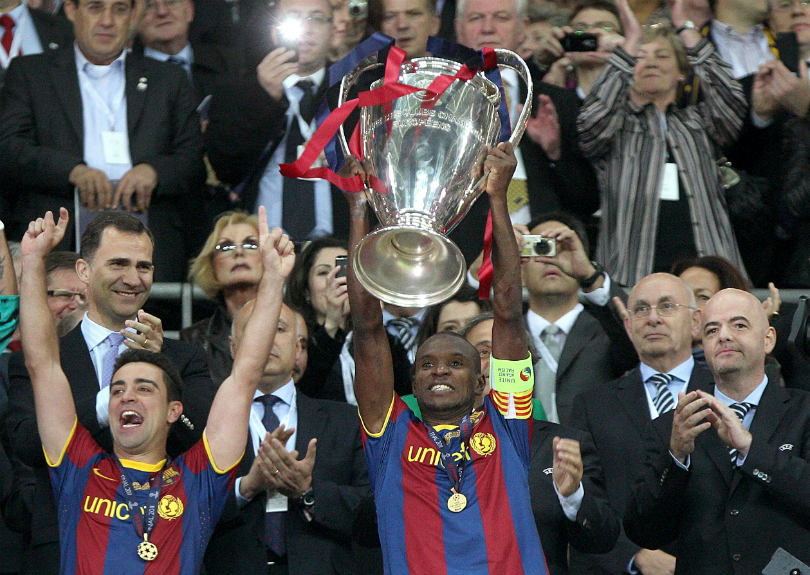
Can you describe the feeling of stepping onto the Camp Nou pitch against Real Mallorca on April 6, 2013 for your first game for more than a year, following a liver transplant?
Mourad Kourbaj, via Facebook
That was not my game. It was for my family and those who’d supported me. I couldn’t have come back alone. Coming back the second time was much tougher than the first.
Once you’ve come back from serious illness, does it alter how you see the game? Did it put defeats on the pitch into perspective?
Trevor Spillane, via Facebook
No. I didn’t play football just to play football. If you have this mentality then you have to stay at home.
I’ve always been a competitor; someone who fights. It’s more than a game to me. But of course cancer changes you. It changed my life. I’m a better person because of it – I prioritise what is important and want to enjoy every second of my life.
They should maybe have explained to me what ‘professional’ meant because there was no player more professional than me.
There are conflicting stories about whether Barcelona paid you during your illness – can you clear that up? If they didn’t pay you, did you think they should have done?
Eric Wardon, Facebook
It’s not about money. What I didn’t really understand was the end, when I left the club in 2013 after I’d fought for Barcelona. Should they have given me another year’s contract? I don’t know.
They made their decision and I had to accept it. They said it was a ‘professional’ decision, but it was a very, very difficult moment for me and my family. They should maybe have explained to me what ‘professional’ meant because there was no player more professional than me.
Did you notice a briefly chuffed Alex Song step forward when Puyol was trying to present you with the league trophy in 2013? Did he get stick for that?
Kev Moss, Facebook
[Laughs] It was funny – he really thought the trophy was for him! I didn’t actually see it when it happened, just on television later, so I joked with him about it afterwards. But winning those trophies was a big moment for all the players and Alex was right to enjoy it as well.

Did you get any offers from clubs in the Premier League when you left Barça? Liverpool and Arsenal were both reported to be interested in signing you; if there was an offer, why did you decide against it?
Jamie Hodge, Dulwich
I had no offers from England after Barcelona. Liverpool approached me before – Gerard Houllier, who had been my coach at Lyon, told me to go. I said: ‘Look, I know Liverpool is a very big club, but I want to go to Barcelona’.
I’d have liked to have played in England. My fighting mentality would have worked there, with all the running and box-to-box football.
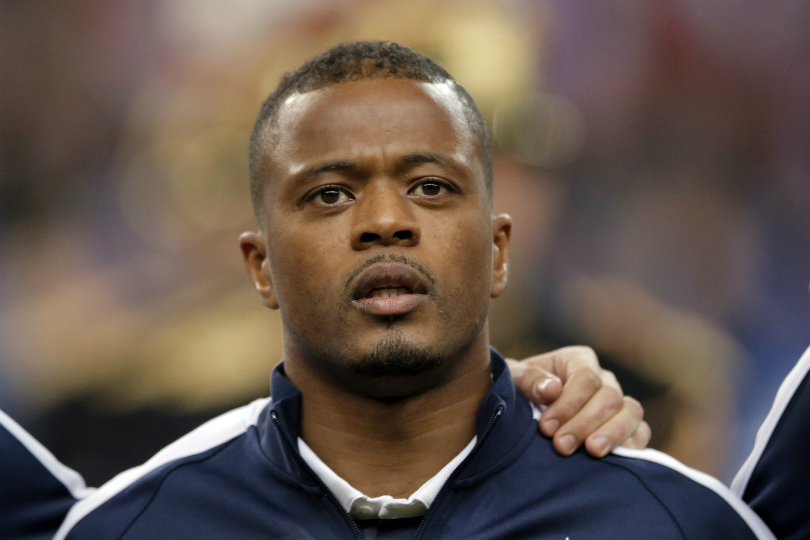
You signed a contract extension with Monaco, then two days later you agreed a two-year deal with Olympiacos instead. What happened there, then?
Marc Howard, Facebook
My Monaco contract had a renewal clause after I played 25 games, so it was going to be extended automatically. But just before I signed I found out the Monaco coach was apparently looking for a different type of defender – a faster one.
I knew I was the fastest defender in the team but I said ‘OK’ and respected his decision. Then Olympiacos called.
I liked my time there – I was impressed by the club and the organisation – but after five months I said: ‘Football is not for me’. Normally when I went to training I wanted to fight for the team. I had lost that – it had gone.
I don’t know why. Maybe I’d used all my energy. It was difficult for the Olympiacos president to accept that and have me for only four months. I spoke to him and said: ‘I’m not a bad guy, but I don’t want to play just for money’.
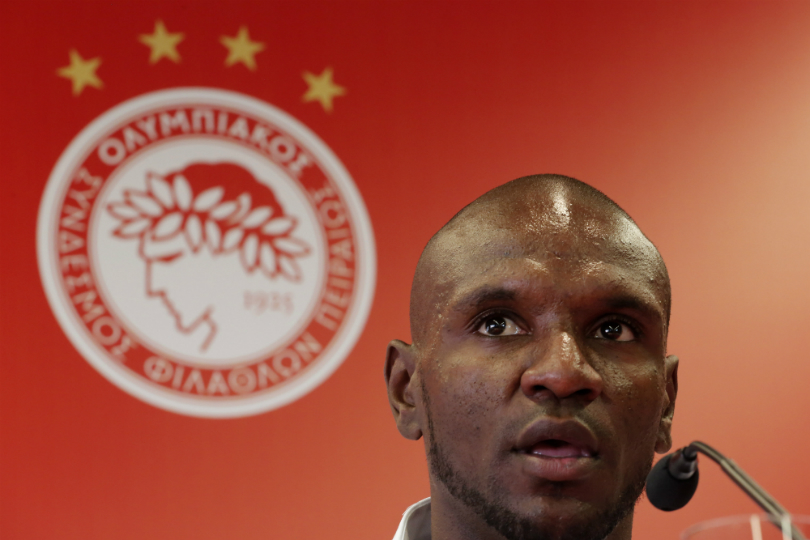
What was your instant reaction to Zinedine Zidane’s headbutt on Marco Materazzi in the 2006 World Cup Final? Did the other players feel let down?
Aimee Hunt, via Twitter
He said sorry in the dressing room straight after the game, I remember that. I don’t remember the headbutt. I didn’t see it.
I was running and thinking only about defending. It was the World Cup final – we all had to focus. We still thought that we could win the World Cup despite going down to 10 men, but unfortunately we lost on penalties.
It’s easy to take a penalty when you’re winning 4-0, but it’s not easy in the final of the World Cup. Only players with balls can do that. I had balls.
You took and scored France’s third penalty in the shootout. Did you always fancy yourself to hit the net from 12 yards?
Indy Dhaliwal, via Twitter
Penalties are 50-50, but I told the coach that I wanted to take one. I had no doubts, but some players said: ‘If Abidal takes one, we’ll lose for sure’. I’m not naming them. They were serious, though.
In football there are important moments – you play for these moments. The more pressure, the better – that’s how I saw it. What I want to know is how many players would step up to take a penalty in the World Cup final.
It’s easy to take a penalty when you’re winning 4-0, but it’s not easy in the final of the World Cup. Only players with balls can do that. I had balls. I wasn’t afraid.
How bad was the atmosphere in the France camp during the 2010 World Cup? Are the rumours overblown or was it really that bad?
Francois, via Twitter
The coach and federation made a big mistake by sending home [Nicolas] Anelka and the team did not accept that decision. After that it was very difficult for us: the mood between the players and the staff was not good.
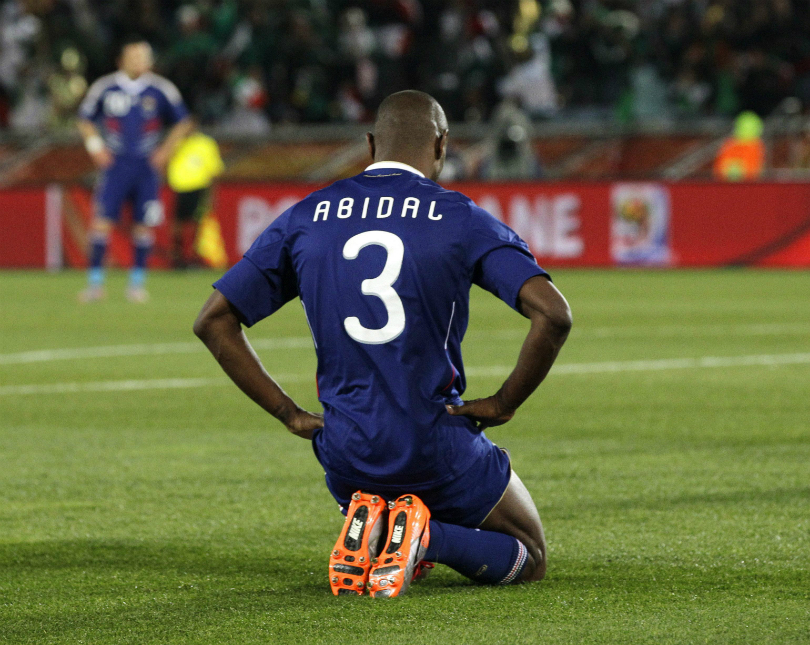
You once said, “As a defender my aim is to infuriate the opponent”, but which player do you think you infuriated the most?
Rik Foulkes, via Twitter
Cristiano Ronaldo, Lyon against Manchester United, 2004. He had to change wings. My friends said to me: ‘Hey, be careful: Ronaldo is coming and he’s good’. I told them not to worry and when he changed sides during the game, I thought: ‘Thank you. Unlucky!’
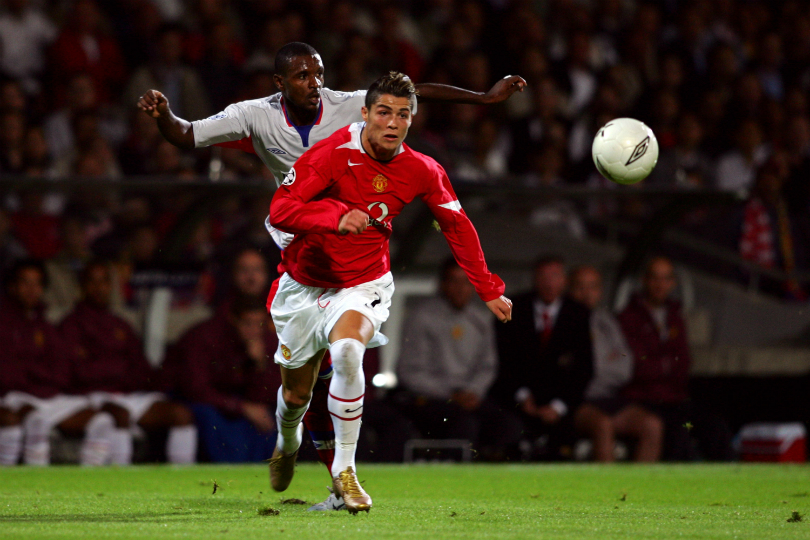
What’s next? When you retired you said Barcelona had offered you a role back at Camp Nou – does that still stand?
Gloria, via Twitter
My foundation is the most important thing for me now and I’ve also started a master’s for UEFA, to be a sporting director at a club.
For more information on Eric Abidal’s foundation, visit ericabidalfoundation.org
This feature first appeared in the February 2016 issue of FourFourTwo magazine. Subscribe!
More features every day on FFT.com • Interviews • More Barcelona
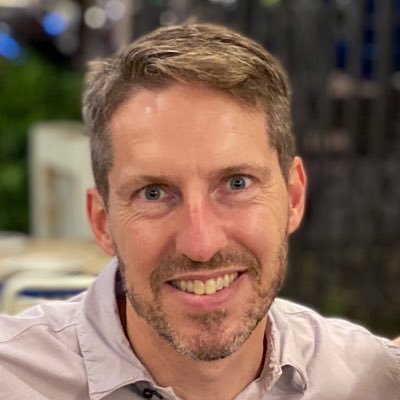
Andy Mitten has interviewed the likes of Lionel Messi, Eric Cantona, Sir Alex Ferguson and Diego Maradona for FourFourTwo magazine. He also founded and is editor of United We Stand, the Manchester United fanzine, and contributes to a number of publications, including GQ, the BBC and The Athletic.
 Join The Club
Join The Club





